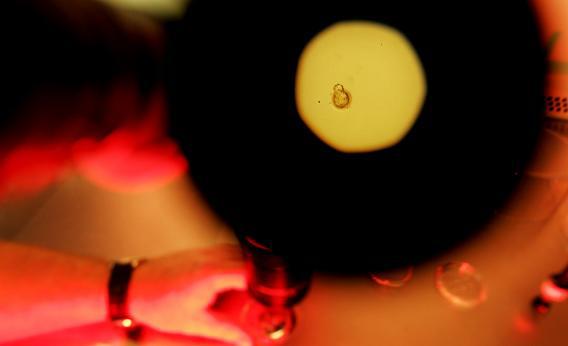A new study conducted by University of Washington scientists shows that scientists can now discover virtually all of a fetus’s genome from a simple, non-invasive test that takes a blood sample from the pregnant woman and saliva from her man. The test has problems, but it is a significant step toward being able to discover genetic problems in a fetus through easier and less dangerous means than amniocentesis.
All of which, naturally, raises more questions than it answers. How widely will this test be used? How reliable will it be? How will it affect the abortion debate? How will affect the abortion rate? And most importantly: Is more information always better?
Science offers a kind of myopic knowledge. In this case as in many others, it gives us information without wisdom, the ability to discover something without the ethical framework for knowing what to do with the discovery. Already, the established camps in the abortion debate are taking sides over this new testing. The University of Washington study, published Thursday in the journal Science Translational Medicine, quickly made it to the top of The Drudge Report, with the headline, “Babies could be tested for 3,500 ‘genetic faults.’ ” Babies, not fetuses—a dog whistle for the anti-abortion camp if ever there was one.
On the other side of this debate are many prospective parents, who would seem to have a stake in knowing more about the children they’re likely to bring into the world—or possibly, the genetically impaired fetuses they’ll choose not to make into children. The new non-invasive tests offer the chance to detect terrible diseases like cystic fibrosis and Tay-Sachs. They can be done earlier in pregnancy than amniocentesis, giving parents more time to decide what (if anything) to do. They are, for the moment, extremely expensive, and not terribly reliable (the just-published study admits a large number of false positives), but the hope is that in time, this new form of fetal testing becomes increasingly accurate and affordable.
As Will Saletan pointed out recently, Americans are generally in favor of knowing more about fetuses developing in the womb. The more information, the better, and knowledge is power, and all that. Unless you explicitly mention abortion to subjects in surveys, they support prenatal genetic testing whether or not this knowledge could lead to abortions in the case of more serious conditions (cystic fibrosis) or moderately serious ones (Down Syndrome) or conditions that aren’t conditions at all (being a girl). Anti-abortion forces fear an increase in abortions as a result of these tests, Saletan writes, but they will have difficulty restricting this kind of prenatal testing because it puts them “in the politically untenable position of opposing information and health care, not just abortion.”
Mara Hvistendahl has written in Slate that insurance companies and medical interests are also supportive of the new prenatal tests, which a number of companies are just starting to offer. But as she notes, there are troubling implications for knowing so much about a fetus. At the far end of theory (and frankly, less persuasive to me), are science fiction-esque scenarios in which parents start selecting (and aborting) on the basis of things like “athletic prowess,” suggests the New York Times. Hvistendahl puts it this way: A “Gattaca-like two-tiered society, in which parents with good access to health care produce flawless, carefully selected offspring and the rest of us spawn naturals, seems increasingly plausible.”
More likely in the immediate future is a mother getting one of these fetal tests in the interests of knowing more, and then realizing that the information is not definitive, and she can’t do anything with it except wonder and worry. What if, as the Times suggests, a genetic test produces evidence of a mutation that may or may not ever cause a disease? Or what if the test results in a false positive for a Tay-Sachs, a deeply troubling scenario if one is considering something so irrevocable as abortion?
In a strange way, the science is the easy part. It takes years, and encompasses false starts and requires considerable funding, but in the end, conclusions are made, papers published. Knowing how to use the information—indeed, whether to use it at all—is far more difficult.
